“A Fundamental Solution to the Environmental Crisis”
Hello! A new day has dawned at Dubuk Retreat Center.

After finishing the morning practice and meditation, Ven. Pomnyun Sunim changed into work clothes and went up to the bamboo forest. There he began harvesting bamboo shoots before the sun rose high.

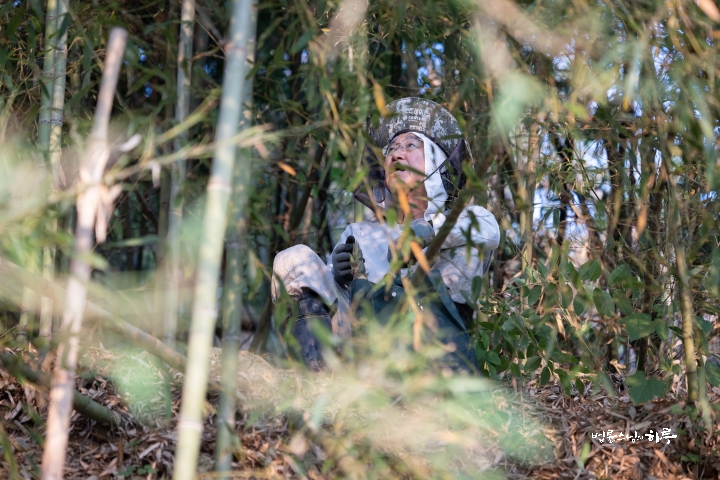
“A lot of bamboo shoots have emerged today.”
Sunim harvested them easily by lightly kicking or pulling them. After gathering a burlap sack full of bamboo shoots, Sunim left the forest.
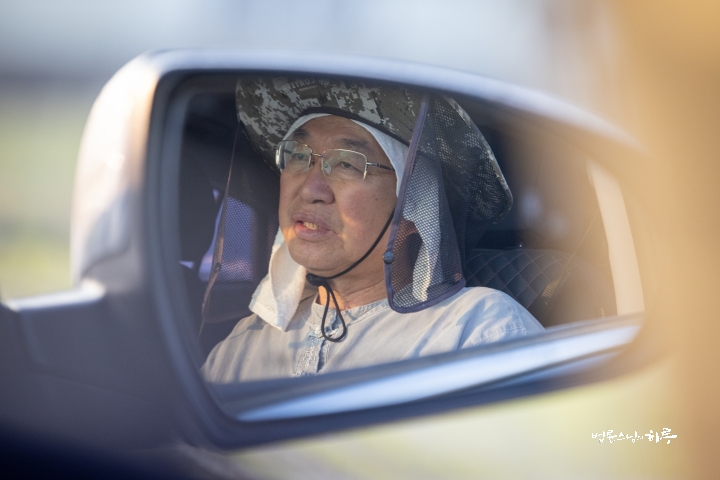
Sunim spread the bamboo shoots on a board to remove the skins, which came off easily. Then he set each one on a cutting board to slice it in half.
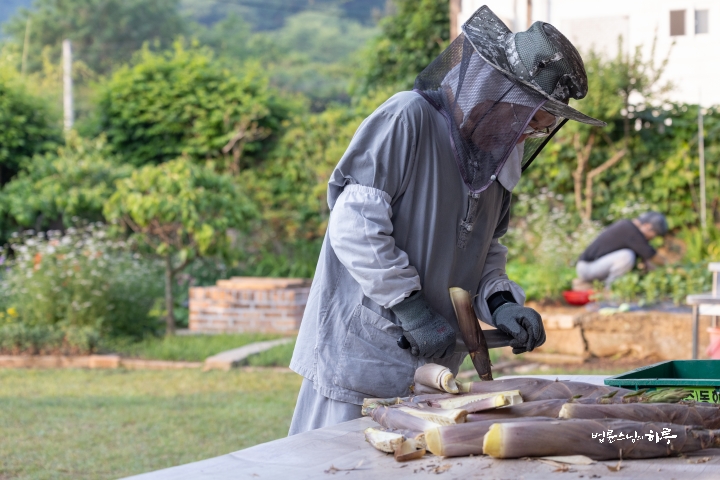
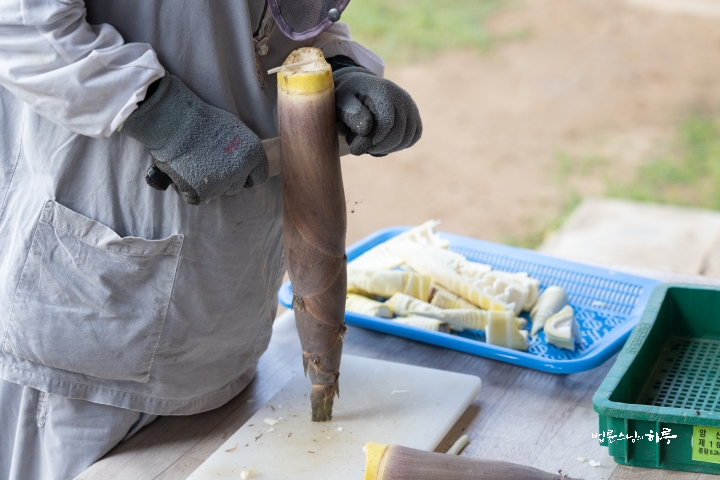
Sunim sorted the bamboo shoots into hard and soft parts and then boiled them in water.
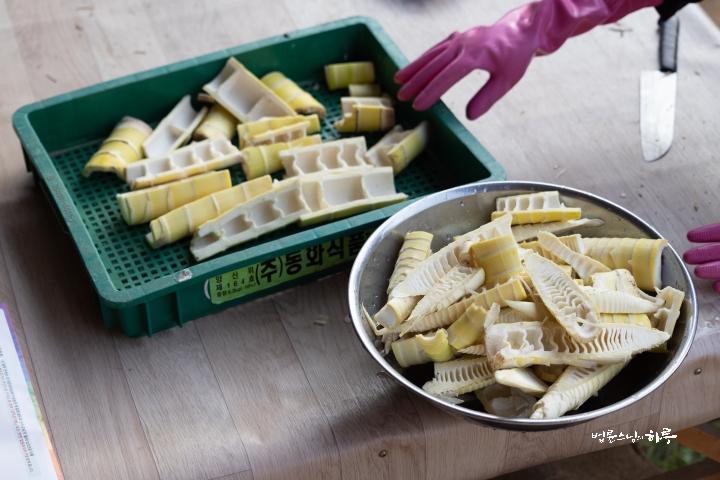
Sunim then decided to harvest some fresh vegetables to take to Seoul in the evening. In the vegetable garden, the lettuce has been growing rapidly.
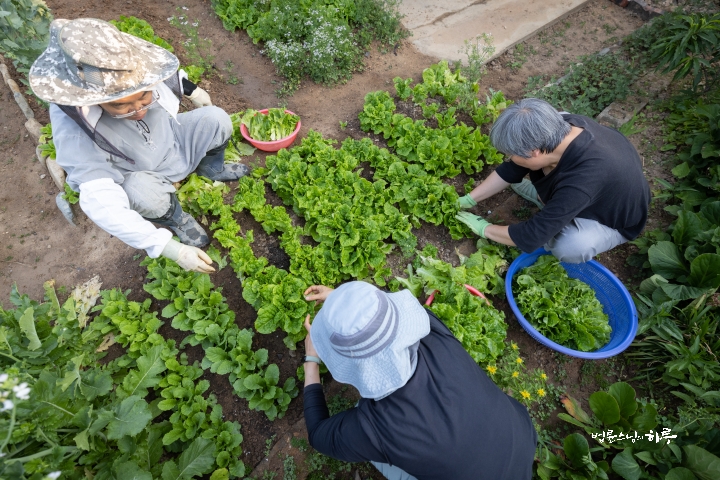
“I’ll harvest lettuce from this row. Myodeok Beopsanim and Haengjanim, please harvest lettuce from other rows.”
The three of them set to work diligently and two baskets were quickly filled with lettuce.
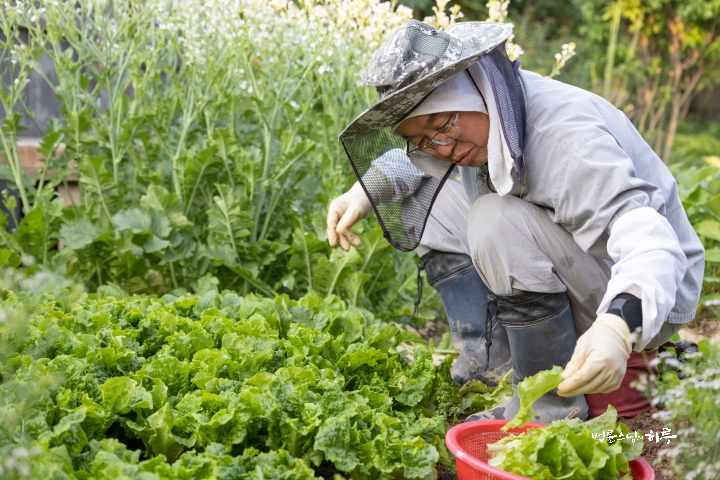
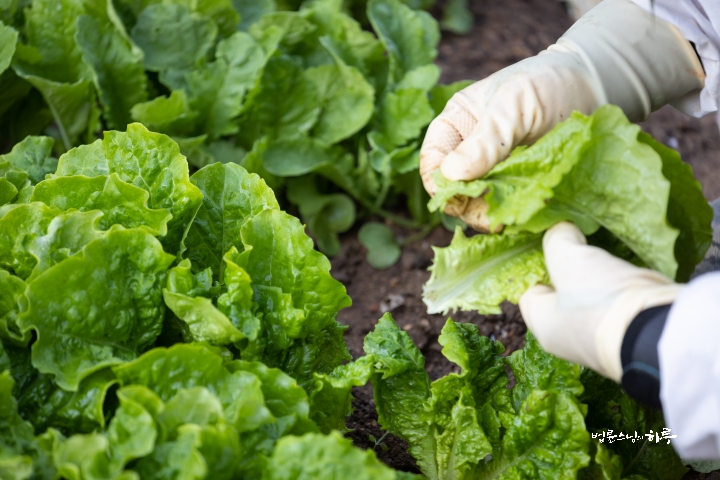
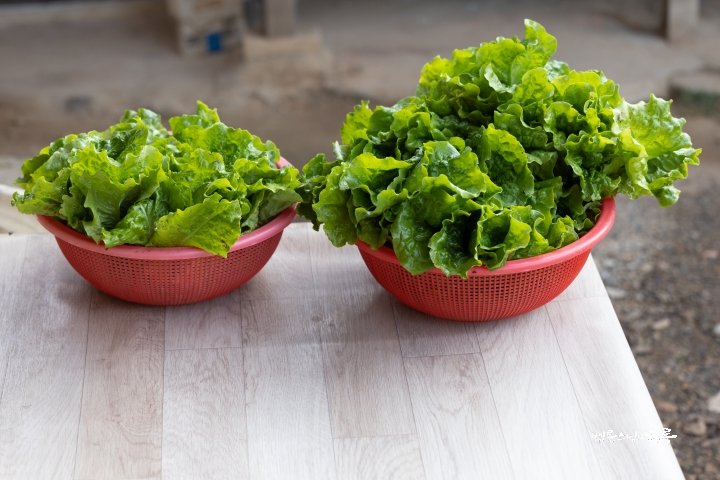
“I think this is enough to take to Seoul.”
After harvesting the lettuce, Sunim hurried to the plastic greenhouse.
“I am supposed to help spray pesticide on the pepper plants, but I’m late. Let’s hurry.”

When we arrived at the greenhouse, the agricultural team haengjas (*Pabbajja program participants) had already started to work. It had only been a short while ago that the seedlings were transplanted, but aphids had already appeared on the pepper plants. As the agricultural team was busy planting rice seedlings throughout the last week, they didn’t have time to pay attention to the crops in the greenhouse. In the meantime, the aphids had spread.

“This problem happened because we are shorthanded. The agricultural team should have been divided into a group to work in the dry fields and a group to work in the paddy fields…tsk, tsk.”
Sunim consoled the agricultural team haengjas, who were disconsolate about the aphids.

“I should be of help to you, even if only a little—what can I do for you?”
“We’ve prepared an organic pesticide, please spray the pesticide thoroughly on the upper and lower sides of the pepper leaves.”
“Okay. Let’s each take a row and spray.”

Other members of the agricultural team were busy, so four people, Sunim and three haengjas, started to spray the pesticide. As all of the pepper plants in two greenhouses needed to be sprayed, it took a long time.




“I think it’s better to spray the lower sides of the leaves first and then the upper sides. If we spray the upper sides first, the leaves droop and it is more difficult to reach the underside.”
Sunim finished spraying a row and then moved on to the next. After moving back and forth without stopping, the work was completed by 8:30 am.

“Thank you for your hard work. Today, the temperature is forecast to reach 31ºC. So don’t work in the field; take a rest during the day.”
The residents of Dubuk Retreat Center had been busy planting rice seedlings until yesterday. So it was decided that they should rest during the day. But Sunim went to harvest lettuce with two haengjas because a neighbor said that we may take some. Sunim harvested four boxes of lettuce. The lettuce was trimmed nicely and packaged to take to Seoul.

After resting for a while, Sunim visited an elderly neighbor at around four in the afternoon. She has been growing crops in the field, but due to the drought, they were in need of water, so she asked for help to connect a hose to her field several days ago.

“Halmeoni (meaning grandmother, also a term used to address elderly women), I’m here to connect the hose.”
“It’s all right. I’ve already done it.”
“Really? I came to do it today . . .”(Laughter)
“It’s all right. Thank you anyway.”

Leaving the smiling neighbor behind, Sunim returned to Dubuk Retreat Center. It was sweltering inside the renovated old school building as if it were already midsummer. Sunim proofread manuscripts.
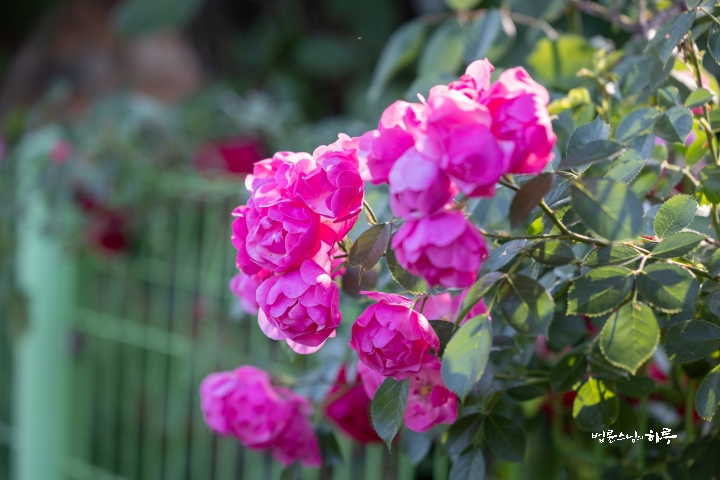
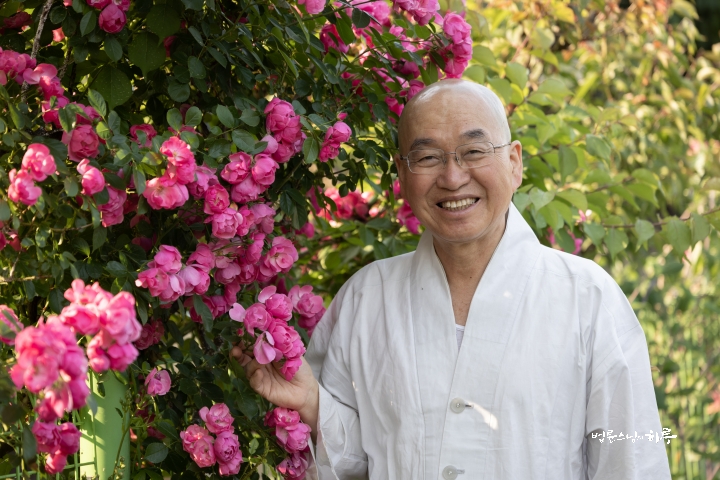
Later that day, after the sun had set, a cool breeze blew.
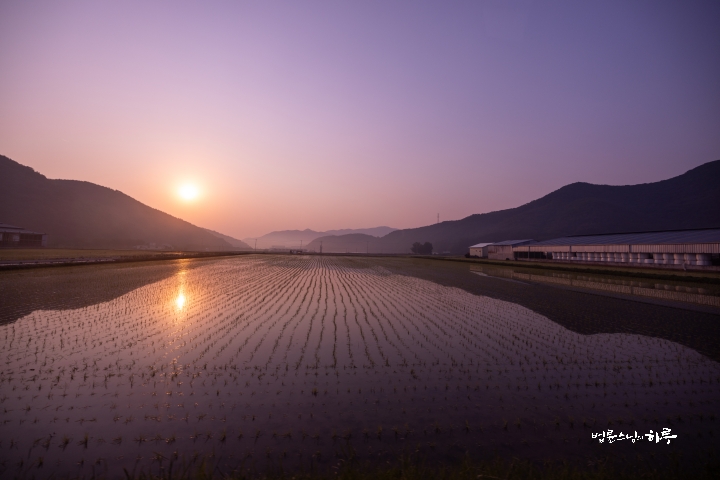
At 8 pm, the live-streamed Jungto Dharma School began. Sunim greeted the students as they joined the video conference.
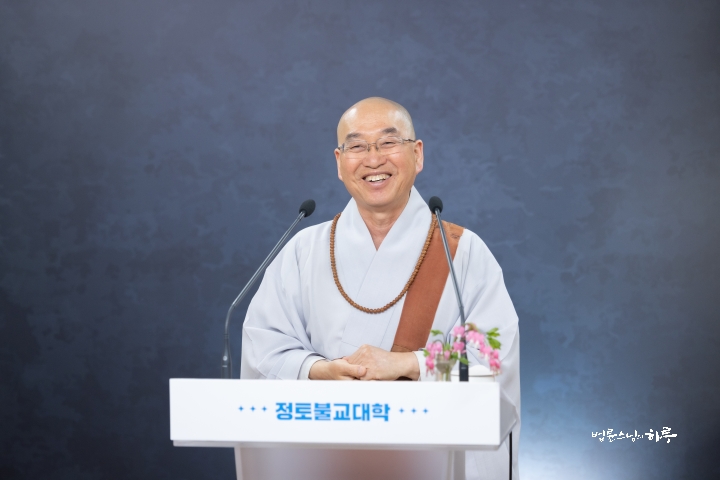
“Doing 108 prostrations and meditation every morning was your practice assignment for last week. How did it go? Please share your experiences with us.”
Several students tapped the Raise Hand button to speak.
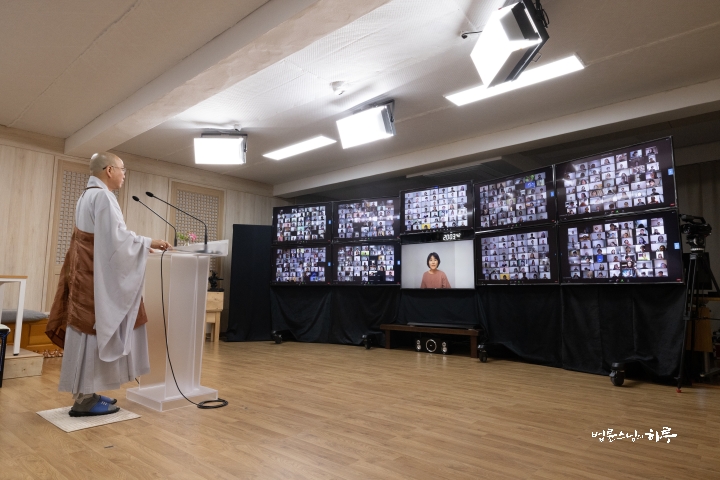
“Doing prostrations every morning made me feel low and humble.”
“I had to overcome my dislike for waking up early in the morning every day, it was really difficult. But I will continue to do it.”
After listening to the student’s feelings and thoughts about the experience, Sunim talked about the right perspective to have.
“Thank you for sharing your experiences. Get up right away when your alarm goes off instead of thinking ‘I should get up.’ Thinking ‘I should get up’ means you don’t want to get up. You tell yourself to get up only when you are not up. Once you wake up, there is no need to tell yourself, ‘I should get up.’ Set an alarm and practice getting up immediately when your alarm goes off. If you will yourself or intend to get up, you won’t be able to get up. Try getting up immediately as soon as the alarm sounds.
As Sunim had been busy planting rice seedlings for the last several days, a video of Sunim in the rice paddy was shown.
“Looks fun, doesn’t it? I hope you visit one of the main temples near you and weed the fields or work in the garden. It is really fun to work hard until you sweat in the spring.”
Today’s teaching topic was “Buddhism and the Environment.” Three lectures have been planned under the theme of Buddhism and society.
Sunim talked about how we should view environmental issues, the source of the environmental crisis, and solutions for environmental problems.
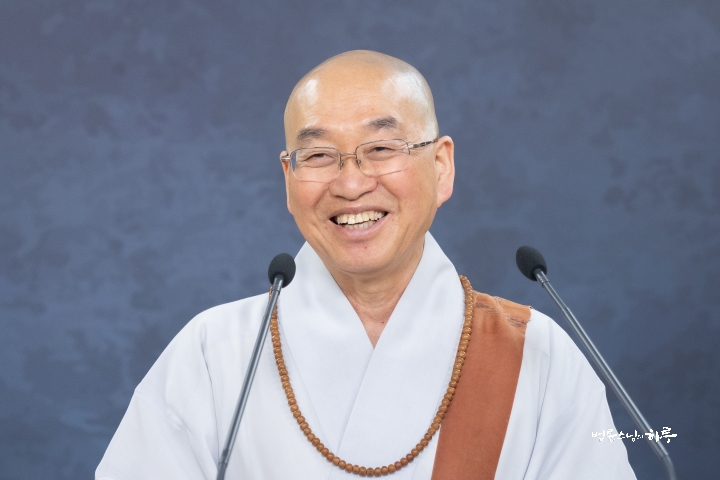
“Today our dialog is about Buddhism and the environment. Some of you might wonder what Buddhism has to do with the environment. We are experiencing hardships due to the climate crisis, and how to overcome this crisis has become a major challenge for the world. European nations have declared a climate emergency. Some countries, including those in Europe, consider the situation to be a matter of urgency, but developing countries such as China are still focusing on economic development and are thus indifferent to the climate crisis. Korea’s economy is on the same level as other developed nations, but we still seem to favor economic development and lack awareness of climate change, perhaps because of lingering memories of extreme poverty in the past.
“However, it is a scientific fact that nature is being destroyed by development-oriented economic policies, and thus the climate crisis is worsening. The destruction of nature is caused by development-oriented economic growth, the attitude that nature needs to be conquered. However, humans and nature do not exist separately but are closely interconnected, like the five fingers of a hand. This is a worldview based on the interconnectedness of all things, one of the fundamental teachings of Buddhism.
What does it mean to live well?
“The fundamental source of the climate crisis, caused by the destruction of nature, is our life values. In short, it’s a matter of ‘what does it mean to live well?’ We all want to live well. When I ask middle or high school students about their wishes, they all say that it is getting good grades. They all say it is their dream to get good grades, to go to a good college, and then to get a good job. When I ask them what is so good about getting a good job, they say that they can make a lot of money with a good job. When I ask them what they will do with all the money, they say that they will buy a nice car and a big house. When I ask them what is so good about getting a nice car and a big house, they say, ‘I will be happy then.’
“Ultimately, our life purpose is happiness. So are those who attend a good college, have a good job, drive a nice car, and live in a big house happy? Is the richest person the happiest? Is the person who holds the highest position the happiest? The head of one of the richest conglomerates in Korea remained in hospital in a vegetative state for a long time before he died. A former president, who held the highest public office in Korea, is still in prison. Some of the most popular entertainers in Korea have committed suicide. And yet can we still say that we will be happy if we make a lot of money and buy a great house, hold a high position, or become very popular? We can’t say that. Conversely, we can say that breathing clean air, drinking clean water, eating clean food, and being healthy is happiness.
“Most people consider a country that produces more and consumes more to be an advanced country. We think of advanced countries as those countries that produce and consume a lot. To produce a lot, mass production is needed. And for mass production, resources inevitably become depleted. The depletion of resources leads to higher prices of raw materials. We are now experiencing climbing prices for raw materials throughout the world. The price of wheat has gone up by 70% worldwide. The prices of all raw materials have almost doubled recently. And consumer prices will rise as a result. The price of petrol has risen twice. Doubled grain prices and petrol prices alone cost a great deal, and now Korea has turned into a trade deficit from a trade surplus. Korea’s energy self-sufficiency rate, including petrol, natural gas, and coal, is almost zero; we depend almost entirely on imports for these resources.
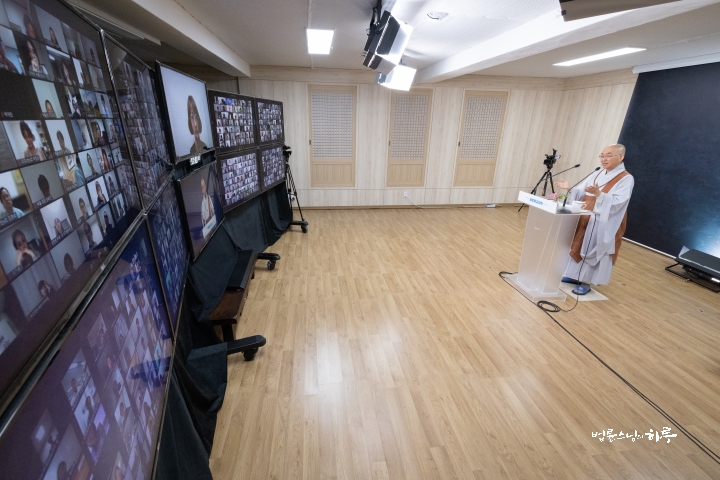
“What about food? Korea is self-sufficient in rice production only, but the proportion of rice consumption to overall food consumption is very low. Korea’s food self-sufficiency rate is about 28%. Moreover, Koreans’ food preferences have changed. Now, Koreans consume a lot of meat to the extent that most imported food is used as feed for livestock. It takes 5kg of corn to produce 1kg of beef or pork, which means consuming 1kg of meat is equivalent to consuming 5kg of grains. Nevertheless, most people consider overconsumption to mean they are living well. The problem caused by food waste is very serious. The disposal cost of food waste in Korea was estimated to be almost 400 million USD 10 years ago, and it must have gone up substantially since then.
A global environmental crisis is threatening people’s lives
“Is consuming a lot living well? Mass consumption requires mass production, which leads to the depletion of natural resources, which in turn leads to raw material price increases, which finally costs consumers. Moreover, mass consumption produces a huge amount of waste and pollutants, which has led to the climate crisis. In the end, the foundation of our life is being eroded.
“If this trend continues, the purification of polluted air, water, and soil will become the biggest challenge for our descendants. Then they will have to spend their entire lives trying to create safe air, water, and food. There will come a day when people have to make enormous efforts to purify the things that we used to receive from nature free of charge because we polluted them. Already, people drink water from water purifiers or drink bottled water. I’ve heard that most well-off families have air purifiers in their homes. Some people even prefer more comfortable and attractive face masks and we are now living in an age where face masks are being advertised. When the destruction of the ozone layer worsens and we can no longer expose our skin to the sun, maybe we will have to wear spacesuits to prevent skin cancer. If that happens, people will probably compete for better or fancier spacesuits. If you make money to spend on things like these, you will have no time left for other things. Is this living well? Shouldn’t we make a world where it is not necessary to wear masks or spacesuits rather than a world where we compete for better masks or better spacesuits?
“Practice helps us to be centered when we ask ourselves important questions like ‘How should I live?’ and ‘What is a truly happy life?’ Practice doesn’t stop at making ourselves happy. It is to relieve our suffering by managing our minds as well as by preventing social and environmental problems. Therefore, practice is a fundamental solution to our current crises and will make our lives sustainable by making the world more peaceful and protecting our beautiful Earth.
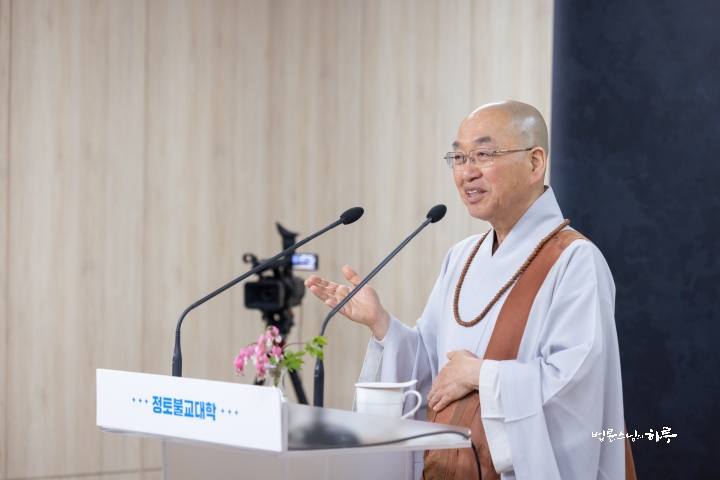
“Social issues are included in the Jungto Dharma School course because we can find solutions to environmental, peace, and poverty issues when we see them from the perspective of the practitioner. Consuming a lot isn’t the way to live well. When we live frugally and are content with what we have, sustainable happiness is possible. When we share our surplus, we can eradicate poverty. Those who share their surplus won’t compete for more. Then society will become peaceful, consumption will decrease, and thus the deterioration of the environment can be averted.
“There are two possible scenarios now. One is that our lives may become more difficult and eventually we humans may go extinct due to the climate crisis. The other is that the natural environment may recover as our movements and consumption decrease due to the self-recovery capabilities of the Earth—such as outbreaks of contagious diseases like COVID-19. It will be unfortunate if humans go extinct due to our unbridled desires and it will be also unfortunate for humans to suffer for the Earth to have a chance to survive.
“To achieve sustainable living that will save both humans and the environment, we must practice moderation and live frugally. Overconsumption should be scorned rather than envied, just as drinking expensive beverages or taking expensive drugs is scorned or liable to penalty rather than envied. However, most people are addicted to consumption, so they envy those who consume excessively rather than feel sorry or pity for them and think that overconsumption should be penalized and regulated. As a result, people are willing to break the law or feud with family members. The most significant cause of our environmental problems is our wrong values.
Shifting to a worldview based on the interconnectedness of all things
“How did humans come to have these wrong values? Early humans relied on hunting and gathering from the natural environment for food. With the development of our cognitive capabilities, however, humans developed crop and livestock farming for a more consistent and stable supply of food. Humans began to view nature as a threat that hampers the stability of our lives. As a result, a perception was formed that the development and control of the natural environment is a way to maintain a stable lifestyle and accumulate wealth. Before the Industrial Revolution, nature could recover from human development in a year or two. However, since the Industrial Revolution, technological development has produced machines that are capable of destroying nature much faster than its self-recovery capabilities. As a result, it is impossible for nature to recover.
“As we look back now after so much of our natural environment has been destroyed, we realize that nature is the foundation of our lives, not a threat that hampers our lives. By perceiving nature as a threat that needs to be conquered, we end up destroying the foundation of our own lives. Therefore, the first step of the environmental movement is to stop the destruction of nature and undo the damage. However, we can’t easily rid ourselves of our lifelong habits and values. We were brainwashed by our parents and educated at school to have such values, and most people around us live with such values. So even if we intellectually know the importance of the natural environment through learning, we act automatically because of the habits ingrained in our bodies and minds. Ultimately, to solve the environmental problems, a shift in worldview needs to occur.
‘The world is not an aggregation of separate beings; all beings are interconnected and thus humans and nature are not separate. When nature is destroyed, humans inevitably suffer.’
“Only when we clearly have a worldview based on the interconnectedness of all things can we overcome consumerism and solve our environmental problems. Our behaviors can change only when there is a change in perception, so environmental education is needed first of all. Then, behavioral change should follow. We should produce no food waste, reduce all waste, and recycle as much as possible. We should save water as much as possible, reduce water pollution by using less synthetic detergents, and stop wasting energy. Many people are not active enough because they ride cars for even short distances, then to make up for their lack of physical activity, they go to a health club and ride a bike that doesn’t go anywhere, or run on a treadmill, which is a waste of energy. People waste energy by leaving electronics plugged in even when they are not in use and leaving the lights on even during the day. These little things add up and create the climate crisis, but people just blame their governments or others while doing nothing themselves to alleviate the crisis. Even environmental activists are indifferent to their own consumption habits while protesting against the construction of dams or nuclear power plants. With such an attitude, how can we hope to solve our environmental problems?
Things you can do to stop the environmental crisis
“Jungto Society has engaged in a ‘Clean Plate Campaign.’ In other words, a ‘Zero Waste Campaign’ and a campaign to promote a lifestyle of ‘practicing frugality in food, clothing, and shelter’ to change consumerism. Consuming less is living well. We should be proud of our frugal lifestyle. Environmental problems can be solved when people’s perceptions change.
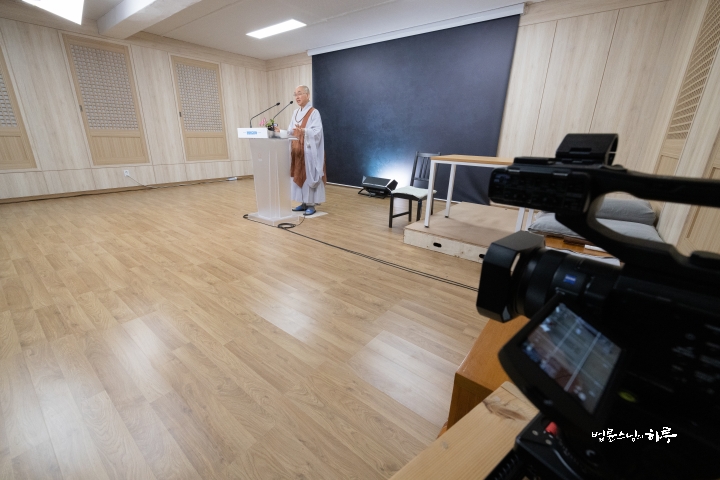
“Therefore, don’t think that studying environmental issues at Jungto Dharma School is studying something unrelated to Buddhism. We study these issues because only through the Buddha’s teachings can we identify the causes of environmental problems and present solutions. The quality of your life and your right to life are under threat due to the climate crisis. The way to maintain the foundation of a happy life free from the fetters of suffering is the preservation of our natural world. How can we practice and save sentient beings while we ignore environmental issues? Any practitioner who wants to put the Buddha’s teachings into practice should change their lifestyles fundamentally to solve our environmental problems.”
Sunim presented practice assignments for this week before concluding the live-streamed lecture. Students shared their thoughts and feelings about this lecture and last week’s practice assignments in their respective video-conferencing rooms.
Sunim left the studio and got into a car to head for Seoul. After driving on the highway for three-and-a-half hours, the car arrived at Seoul Jungto Center at one in the morning.
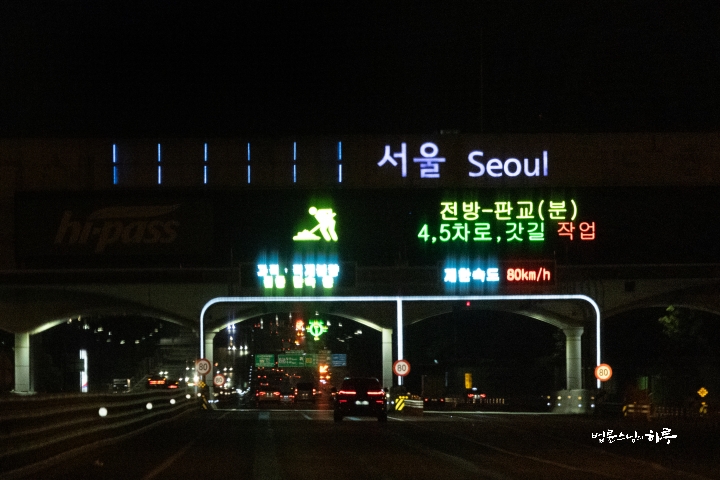
A busy schedule is planned for tomorrow. In the morning, Sunim will participate in a meeting of religious leaders for national reconciliation and peace, participate in a research seminar sponsored by the Peace Foundation, have a meeting with members of the Peace Foundation Planning Committee in the afternoon, and then host the live-streamed Dharma Meeting in the evening.
© 2024 Jungto Society - All Rights Reserved


